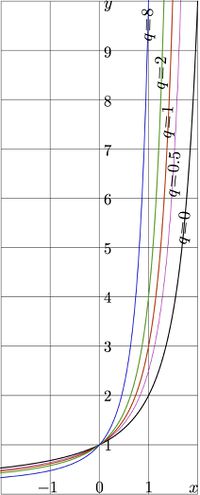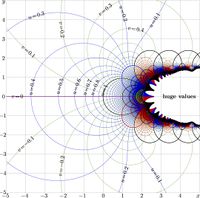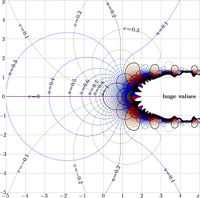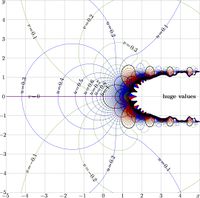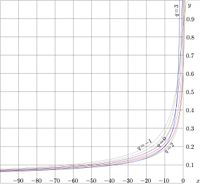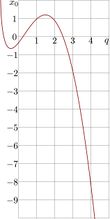SuNem
SuNem is superfunction for the Nemtsov function
\(\mathrm{Nem}_{q}(z)=z+z^3+qz^4\)
It is assumed, that \(q\!>\!0\), although the formula can be used for some other values of the parameters too.
SuNem is specific solution of the transfer equation
\(\mathrm{Nem}_{q}\big( \mathrm{SuNem}_{q}(z)\big)=\mathrm{SuNem}_{q}(z\!+\!1)\).
It is assumed that \(\mathrm{SuNem}_{q}(0)=1\).
Also, the specific asymptotic behaviour at infinity is assumed,
\(\mathrm{SuNem}_{q}(z) = {\displaystyle \frac{1}{\sqrt{-2z}}}\left(1+O\left(\frac{1}{\sqrt{-2z}} \right)\right)\)
for any fixed phase \(\mathrm{Arg}(z)\) different from zero.
For any \(\varepsilon>0\), the formula is valid for any large \(|z|\) such that \(|\mathrm{Arg}(z)|>\varepsilon\).
Along the real axis, SuNem shows fast growth from zero at \(-\infty\) to plus infinity at \(+\infty\).
Asymptotic expansion
Function SuNem is constructed by its asymptotical expansion.
For the superfunction \(F\) of the Nemtsov transfer function \(T=\mathrm{Nem}_{q}\), it can be obtained from the transfer equation
\(T(F(z))=F(z+1)\)
Keping some positive integer mumber \(M\) of terms, the asymptotic solution can be written as follows:
\(\displaystyle \tilde F(z) = \frac{1}{\sqrt{-2z}} \left(1+ \frac{P_m(\ln(-z))} {(-2z)^{m/2}} \right)\)
where \(\displaystyle P_m(z)=\sum_{n=0}^{\mathrm{IntegerPart}(m/2)} A[m,n]\, z^m\)
Substitution of \(\tilde F\) into the transfer equation gives the coefficients \(A\). These coefficients can be calculated with the mathematica code below:
Mathematica generator of the algorithm
The first 18 terms of the asymptotic representation of super function \(F\) can be computed with Mathematica software, using the code below:
T[z_]=z+z^3+q z^4
P[m_, L_] := Sum[a[m, n] L^n, {n, 0, IntegerPart[m/2]}]
a[1, 0] = -q; a[2, 0] = 0;
m = 2;
F[m_,z_] = (-2 z)^(-1/2) (1 + Sum[P[n, Log[-z]]/(-2 z)^(n/2), {n, 1, 2}]);
s[m]=Numerator[Normal[Series[(T[F[m,-1/x^2]] - F[m,-1/x^2+1]) 2^((m+1)/2)/x^(m+3), {x,0,0}]]]
sub[m] = Extract[Solve[s[m]==0, a[m,1]], 1];
SUB[m] = sub[m]
For[m = 3, m < 18,
F[m, z_] = ReplaceAll[(-2 z)^(-1/2) (1+Sum[P[n, Log[-z]]/(-2 z)^(n/2), {n,1,m}]), SUB[m-1]];
s[m] = Numerator[Normal[Series[(T[F[m,-1/x^2]]-F[m,-1/x^2+1]) 2^((m+1)/2)/x^(m+3),{x,0,0}]]];
t[m] = Collect[Numerator[ReplaceAll[s[m], Log[x] -> L]], L];
u[m] = Table[
Coefficient[t[m] L, L^n] == 0, {n, 1, 1 + IntegerPart[m/2]}];
tab[m] = Table[a[m, n], {n, 0, IntegerPart[m/2]}];
Print[sub[m] = Simplify[Extract[Solve[u[m], tab[m]], 1]]];
SUB[m] = Join[SUB[m - 1], sub[m]];
m++];
For[m=1, m<18,
For[n=0,n<(m+1)/2,
A[m, n] = TeXForm[ReplaceAll[a[m, n], sub[m]]];
Print["APQ[", m, "][", n, "]=", A[m, n], ";"]
n++];
m++];
Evaluation of superfunction
First, the superfunction of the Nemtsov function is constructed, that does not satisfy the requirement on its value at zero. The idea is to use the asymptotival expansion \(\tilde F\) of the superfunction in the area, where it provides the good approximation, displacing the argument of superfunction into this area with using of the transfer equation.
Superfunction \(\mathrm{SuNe}_q\) of the Nemtsov function \(\mathrm{Nem}_q\) appears as limit
\(\displaystyle \mathrm{SuNe}_q(z)=\lim_{n \rightarrow \infty} \mathrm{Nem}_q^{\,n} (\tilde F(z\!-\!n))\)
Explicit plot of function \(\mathrm{SuNe}_q\) is shown in figure at right for \(q=-1, -0.5, 0, 0.5, 1, 2, 3~\). Then, function SuNem appears with the appropriate displacement of the argument:
\(\mathrm{SuNem}_q(z)=\mathrm{SuNe}_q(x_0(q)+z)\)
where displacement \(x_0=x_0(q)\) is real solution of equation \(F_q(x_0)\!=\!1\). This solution is shown in figure at left. In order to show the general trend of function \(x_0\), the graphic is extended a little bit into the range of negative \(q\).
Inverse function
Inverse function of SuNem is function AuNem, that is Abel function of the Nemtsov function; in wide range of values of \(z\), it satisfies the Abel equation
\(\mathrm{AuNem_{q}} \big( \mathrm{Nem_{q}}(z)\big) = \mathrm{Nem_{q}}(z\!+\!1)\)
Iterates of the Nemtsov function
With functions SuNem and AuNem, the iterates of the Nemtsov function can be written as usually:
\(\mathrm{Nem}^n(z)=\mathrm{SuNem}(n+\mathrm{AuNem}(z))\)
References
Keywords
AuNem, Book, Exotic iterate, Nemtsov function, SuNem, Superfunction
